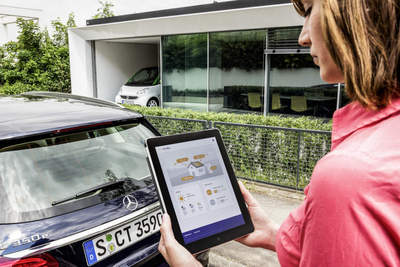Battery Technology for Daimler is Accelerating the Transition to Renewable Energy Generation
 From cars to power grids: Mercedes-Benz energy storages are also suitable for private use to buffer surplus power virtually free of any losses. |
- Daimler subsidiary Deutsche ACCUmotive developing new business field with stationary energy storage plants
- First industrial-scale storage unit already on the power grid, operated in cooperation with The Mobility House and GETEC
- Plans for cooperation with EnBW in private customer segment
STUTTGART/KAMENZ -- June 1, 2015: Daimler is entering into
business in the field of stationary energy storage plants with its one
hundred percent subsidiary Deutsche ACCUmotive. The first industrial-scale
lithium-ion unit is already on the grid and is being operated by the
partner companies The Mobility House AG and GETEC Energie AG. For business
with private customers in the area of energy storage in Germany, Daimler AG
is planning to collaborate with EnBW AG. Daimler is also aiming to enter
into cooperation with other sales and distribution partners both in Germany
and at international level. "Mercedes-Benz energy storages provide the best
confirmation that lithium-ion batteries Made in Germany have a viable
future," says Harald Kröger, Head of Development Electrics/Electronics
& E-Drive Mercedes-Benz Cars. "With our comprehensive battery expertise
at Deutsche ACCUmotive we are accelerating the transition to sustainable
energy generation both on the road and in the field of power supply for
companies and private households. The technology that has proven its worth
over millions of kilometres covered in the most adverse conditions, such as
extreme heat and cold, also offers the best credentials for stationary use.
We have been gathering initial experience in this field since 2012."
Established in 2009, Deutsche ACCUmotive GmbH und Co.
KG develops, produces and markets highly complex drive batteries for hybrid
and electric vehicles of the Mercedes-Benz and smart brands on the basis of
lithium-ion technology. Deutsche ACCUmotive's entry into the new business
field of stationary energy storage plants for industrial customers and
private applications offers the company fresh opportunities for growth. At
the same time, Daimler AG is making an active contribution to the process
of transition towards sustainable energy generation and continuing the
success story of German-based battery production. Daimler's first
industrial-scale storage unit on the German power grid is being operated by
the partners The Mobility House and GETEC through the joint venture Coulomb
and marketed on the German energy exchange. Coulomb is deploying the energy
storage plant from Kamenz, Saxony for the purposes of grid stabilisation
and to smooth load peaks. These are tasks usually performed by coal-fired
and nuclear power stations. 96 battery modules of the Mercedes-Benz energy
storage plant with a total capacity of more than 500 kWh are already on the
grid, to be increased step-by-step to 3000 kWh by the partners The Mobility
House and GETEC in the coming weeks.
From industrial deployment to private
use
The concept evolved by Daimler
Business Innovation goes far beyond industrial deployment. The business
model also includes operation in the SME segment - at supermarkets, for
example. Here too, the stationary energy storage plants can buffer load
peaks on hot days.
Mercedes-Benz energy storages
are also suitable for private use. Households with their own photovoltaic
systems can buffer surplus solar power virtually free of any losses.
Initial plants are already running in trial operation.
EnBW is offering interested private customers complete
distributed energy supply solutions.
High-tech battery module made in
Germany
Developed for demanding service
on board cars, the Mercedes-Benz energy storage units meet the very highest
safety and quality standards. The battery modules with an energy content of
2.5 kWh (private) and 5.9 kWh (industrial) are produced by Deutsche
ACCUmotive in Kamenz, Saxony, employing state-of-the-art production
methods. For use in the private sector, up to eight battery modules can be
combined to produce an energy storage plant with a capacity of 20 kWh. The
systems are fully scalable to requirements for commercial and industrial
use.
The Mercedes-Benz energy storage plants
will be available for ordering as of June, with deliveries scheduled to
begin this autumn.
About Deutsche
ACCUmotive
Established in 2009,
Deutsche ACCUmotive GmbH und Co. KG is a 100% subsidiary of Daimler AG. The
company develops, produces and markets highly complex drive batteries for
hybrid and electric vehicles on the basis of lithium-ion technology.
Deutsche ACCUmotive is headquartered in Nabern in the greater Stuttgart
area, where its research and development facilities are also located. Its
production operations are based in Kamenz, Saxony. The Daimler subsidiary
employs a workforce of over 250 – some 170 in Kamenz and around 80 in
Nabern. Production operations in Kamenz are currently undergoing expansion,
with the workforce set to be almost doubled by 2016. Daimler AG will be
investing around 100 million euros in Deutsche ACCUmotive in the coming
years. On completion of a third production shop this year, the company will
have almost 20,000 m² of production and logistics space in Kamenz -
representing a fourfold increase since production started up in 2011.
Deutsche ACCUmotive has delivered more than 60,000 lithium-ion batteries to
date. The company is expecting rising production figures for battery
systems for automotive applications and in the new business segment of
stationary battery storage devices.
About Business Innovation
As a pioneering think tank, Daimler Business Innovation
concerns itself with current trends, studies social, cultural and
technological trends and enriches the core business area of automobile
manufacturing with creative solutions and business ideas. Numerous pilot
projects in recent years have spawned new corporate units, such as the
Mercedes-Benz Driving Academy. The Business Innovation teams are based all
over the world. In addition to the headquarters in Stuttgart they are also
located in Istanbul, São Paulo, Buenos Aires, Beijing and in Sunnyvale,
California.


